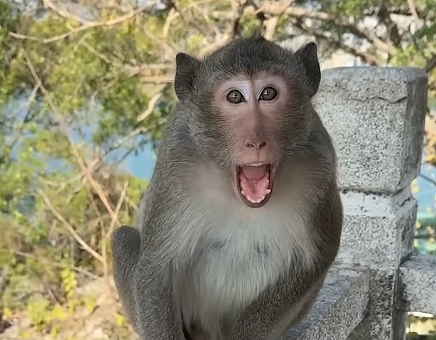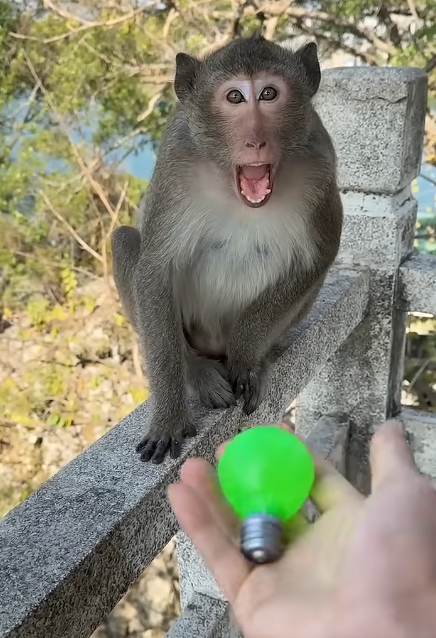
In a quiet little village surrounded by thick green forests and sparkling streams, there lived a mischievous monkey named Kiko. Everyone in the village knew Kiko—not because he was dangerous or scary, but because he was so naughty. He had a talent for getting into trouble and an even bigger talent for making people laugh, even when they were angry at him.
Kiko wasn’t like the other monkeys who lived deep in the forest. While they spent their days searching for fruits and swinging through the trees, Kiko preferred hanging around the humans. He loved the sounds of their laughter, the smell of their food, and the way they reacted when he played tricks on them.
Every morning, as the golden sun rose over the treetops, Kiko would wake up with one thought: What can I do today that’s fun—and a little bit naughty?
One sunny morning, Kiko climbed down from his favorite mango tree and crept toward the market square. The villagers were setting up their stalls, arranging fruits, vegetables, and handmade crafts. It was the perfect time for a little mischief.
He spotted an old fruit seller, Grandma Lita, arranging piles of ripe bananas. Kiko’s eyes sparkled. Bananas were his favorite, and he could never resist them. Quietly, he crept closer, using the crates and baskets as cover. When Grandma Lita turned around to talk to a customer, Kiko stretched out his furry little hand and snatched a banana. Then another. And another!
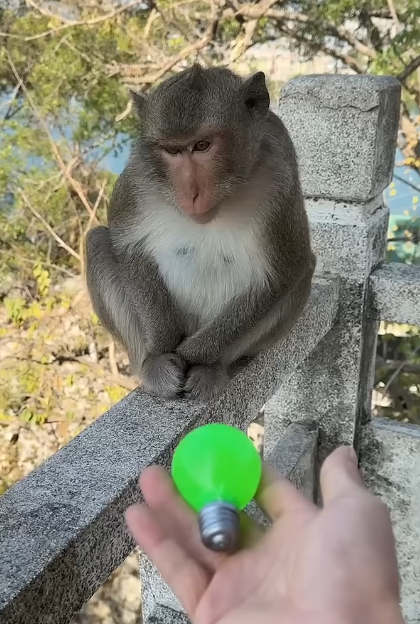
But before he could escape, Grandma Lita turned around and shouted, “Kiko! You naughty monkey!”
Kiko froze for a moment, his cheeks stuffed with bananas. Then, with a squeal of laughter, he leapt into the air, doing a little flip before climbing up the nearest roof. From there, he peeled his stolen bananas and ate them proudly as the villagers laughed.
“Someday that monkey will outsmart himself,” Grandma Lita said with a sigh—but even she couldn’t help but smile.
That afternoon, Kiko wasn’t done causing trouble. He found a group of children playing near the river, building tiny boats out of leaves and sticks. Kiko thought their boats looked interesting, so he jumped down from the trees and started inspecting them. The children were delighted to see him at first—they adored Kiko’s playful nature—but then, he started taking their boats and tossing them into the water.
“Hey! Kiko!” one boy shouted, laughing and chasing him.
Kiko grabbed a stick, placed it like a captain’s wheel in his hands, and sat proudly on a big rock, pretending to steer a ship. “Ooo-oo-aa-aa!” he squealed, as if commanding his imaginary vessel.
The children laughed so hard that they forgot to be angry. Kiko loved that sound—the laughter of friendship, pure and full of joy.
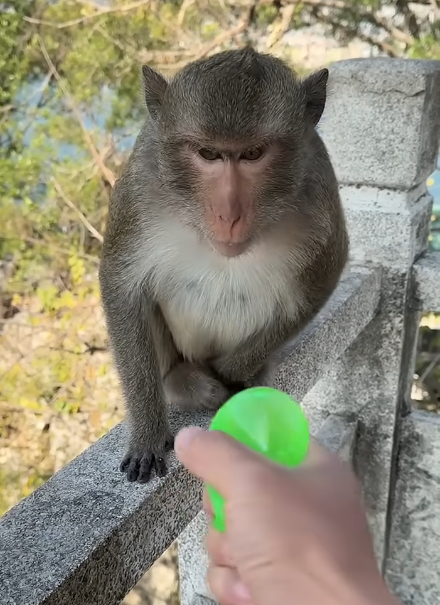
But Kiko’s mischief didn’t stop there. Later that day, he sneaked into a nearby house where a woman was baking bread. The smell was too good to resist. He tiptoed in, grabbed a loaf from the cooling rack, and ran for the door. But this time, his timing was off—the woman spotted him!
“Stop, you naughty monkey!” she yelled, waving her broom.
Kiko dashed out, the bread still in his arms, and climbed onto the roof again. He sat there munching while the villagers gathered below, shaking their heads.
“You’ll never change, Kiko,” one of them said.
But they all knew that, deep down, they loved him. His tricks brought life to their days and laughter to their hearts.
One day, however, Kiko’s naughtiness went a bit too far. It was during the village festival, the biggest event of the year. The villagers decorated every street with flowers and colorful banners, and a grand feast was being prepared. There were piles of fruits, roasted corn, and delicious rice cakes laid out on long wooden tables.
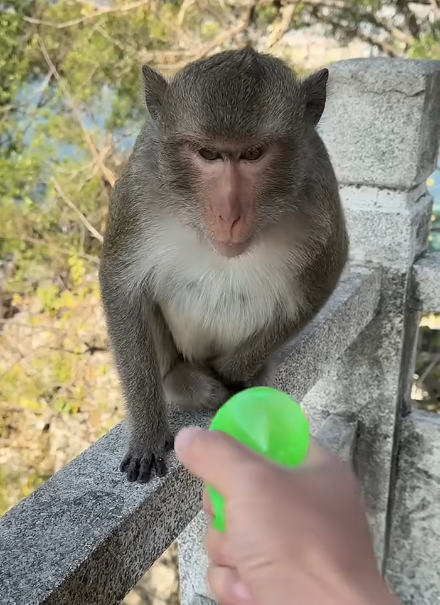
Kiko’s eyes widened when he saw the food. “Hee hee! My lucky day!” he thought.
While everyone was busy dancing and celebrating, Kiko quietly sneaked into the food area. He began tasting everything—one bite from here, one bite from there. He didn’t realize that the village chief, Mr. Tomas, was watching from behind a tree.
When Kiko climbed up the table and grabbed a huge plate of rice cakes, Mr. Tomas suddenly appeared and shouted, “KIKO! STOP RIGHT THERE!”
Startled, Kiko dropped the plate, and the rice cakes flew everywhere—into baskets, into the grass, even into people’s hair! The whole crowd burst out laughing. Mr. Tomas tried to look serious, but even he couldn’t hold back a smile.
“Kiko, you really are the naughtiest monkey in the world,” he said.
Kiko scratched his head, looking guilty—but only for a moment. Then he ran up to Mr. Tomas and hugged his leg, chattering softly as if to say, “I’m sorry.”
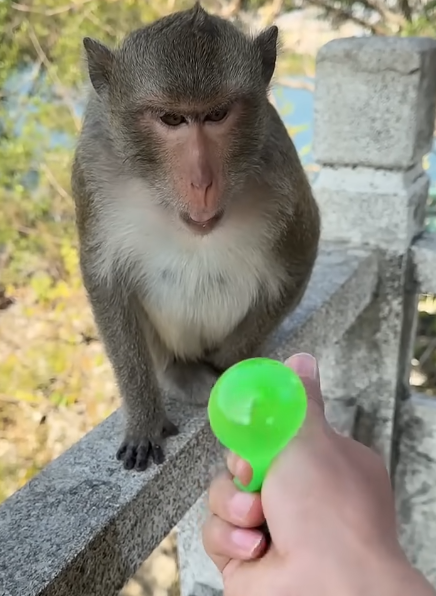
From that day, the villagers decided to make Kiko part of their festival every year. They even gave him his own little chair near the stage, decorated with flowers and a sign that read: “For Kiko, the Naughty Monkey Who Makes Us Smile.”
But did Kiko learn his lesson? Not really. He was still the same mischievous monkey, always curious and playful. Yet, something inside him changed—he realized that even though his tricks sometimes caused trouble, they also brought people together.
One rainy afternoon, Kiko saw Grandma Lita struggling to carry her basket of bananas home. The old woman slipped in the mud, and the fruits rolled everywhere. For once, Kiko didn’t laugh or steal—he rushed to help. He picked up the bananas one by one and put them back in the basket. Then he carried it all the way to her porch.
Grandma Lita smiled warmly and said, “Maybe you’re not so naughty after all, Kiko.”
Kiko grinned and made a funny face, as if to say, “Don’t get used to it!”
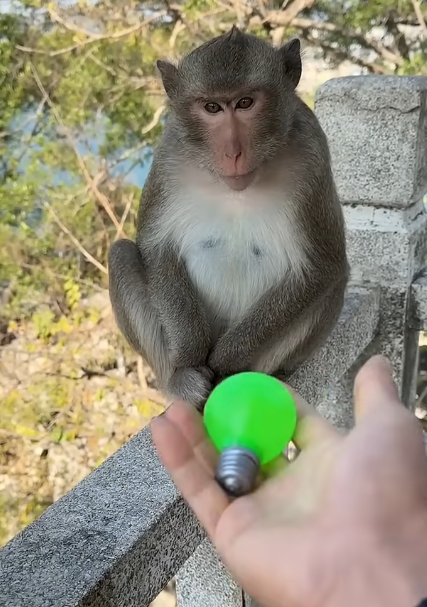
From then on, Kiko’s mischief became a little more harmless—less stealing, more playing. He would still jump onto roofs, snatch hats, or tickle sleeping dogs, but he never hurt anyone. The villagers even built a small treehouse for him near the market so he could stay close without causing too much chaos.
Every evening, when the sun dipped below the mountains, Kiko would sit in his treehouse and watch the villagers preparing for night. The children waved to him, and he waved back.
He loved his little world—the laughter, the love, and even the scoldings. Because deep down, he knew that being a little naughty wasn’t so bad if your heart was full of kindness.
And so, Kiko remained the same playful monkey—cheeky, clever, and full of life. His adventures became stories passed down through generations. Children grew up hearing about the naughty monkey who once stole bananas, crashed festivals, and still won everyone’s heart.
Sometimes, if you visit that village today, you might still hear giggles in the treetops or see a banana peel fall from nowhere. The villagers just smile and say,
“Oh, that must be Kiko. Our naughty little monkey.” 🐒💛
